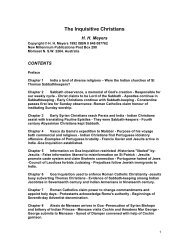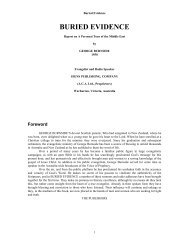Battle of the Bibles - Present Truth
Battle of the Bibles - Present Truth
Battle of the Bibles - Present Truth
You also want an ePaper? Increase the reach of your titles
YUMPU automatically turns print PDFs into web optimized ePapers that Google loves.
BATTLE OF THE BIBLES 2C<br />
H. H. MEYERS<br />
Chapter Twenty-Two<br />
A Twentieth-Century Burgon<br />
Benjamin G. Wilkinson Phd, Dean <strong>of</strong> Theology at Washington Missionary<br />
College, Washington D.C., was a man with a very inquiring mind. Brought up in <strong>the</strong> best<br />
Protestant tradition <strong>of</strong> <strong>the</strong> "Bible and <strong>the</strong> Bible only", he was concerned that <strong>the</strong> Bible on<br />
which his faith had been founded was increasingly being neglected. In fact, in <strong>the</strong><br />
academic world in which he moved, <strong>the</strong> idea was gaining ground that those who<br />
persisted with <strong>the</strong> King James Authorised Version were merely evincing inferior<br />
judgment and poor scholarship.<br />
Wilkinson had devoted considerable study to <strong>the</strong> history <strong>of</strong> Christianity and <strong>the</strong><br />
preservation <strong>of</strong> apostolic truth throughout <strong>the</strong> Dark Ages, also <strong>the</strong> hazardous struggles <strong>of</strong><br />
those who launched and consolidated <strong>the</strong> Protestant Reformation. He was later to<br />
record his research in his classic work, "<strong>Truth</strong> Triumphant", which was published in 1944<br />
by Pacific Press Publishing Association, and ran into several reprints. During his<br />
research, he found that <strong>the</strong> history <strong>of</strong> <strong>the</strong> New Testament Text was inextricably entwined<br />
with <strong>the</strong> struggle to maintain apostolic Christianity against paganism and, later, factional<br />
Christianity. It became clear that it was <strong>the</strong> church which was "driven into <strong>the</strong> wilderness"<br />
that had maintained apostolic truth because it had also been <strong>the</strong> guardian <strong>of</strong> God's Holy<br />
Word. This line <strong>of</strong> Scripture is what was known as <strong>the</strong> Traditional or Byzantine Text,<br />
which was later incorporated into <strong>the</strong> Greek New Testament by Erasmus and <strong>the</strong>n used<br />
by Lu<strong>the</strong>r, Tyndale and <strong>the</strong> King James translators. It is now commonly known as <strong>the</strong><br />
Received Text.<br />
Wilkinson realised that he had sufficient material to bring out a book on this<br />
subject alone, so in 1930 he published his findings under <strong>the</strong> title, "Our Authorised Bible<br />
Vindicated". Apparently he had difficulty in finding a publisher for his book, an indication<br />
perhaps <strong>of</strong> a growing preference for modern versions, for he had to act as his own<br />
publisher. Hence, <strong>the</strong> book's comparatively restricted circulation during his lifetime.<br />
Wilkinson's book indicates that he was in possession <strong>of</strong> Dean Burgon's "Revision<br />
Revised" and that he was in complete agreement with Burgon's contention that <strong>the</strong> very<br />
title "Revised Version" is a misnomer and a fraud. But Wilkinson went much fur<strong>the</strong>r. He<br />
dealt with his subject in its historical settings and demonstrated how <strong>the</strong> diversions from<br />
<strong>the</strong> Received Text affect basic Christian doctrine; eg. <strong>the</strong> divinity <strong>of</strong> Christ, <strong>the</strong> Trinity,<br />
and <strong>the</strong> way in which <strong>the</strong>y are biased toward Roman Catholic <strong>the</strong>ology and against<br />
fundamental Protestantism.<br />
But fur<strong>the</strong>r, he demonstrated <strong>the</strong> highly damaging effect on <strong>the</strong> beliefs <strong>of</strong> <strong>the</strong><br />
church which employed him as an ordained minister - namely <strong>the</strong> Seventh-day Adventist<br />
Church.<br />
Incredibly, although his book enjoyed wide acceptance among his ministerial<br />
colleagues, it was rejected outright by a "Committee <strong>of</strong> Review" set up in 1930 by <strong>the</strong><br />
General Conference <strong>of</strong> Seventh-day Adventists with headquarters in Washington D.C.<br />
The term "incredibly" is used deliberately, for this denomination was one which<br />
arose in America around <strong>the</strong> mid-nineteenth century as a direct result <strong>of</strong> <strong>the</strong> prevalent<br />
interest in <strong>the</strong> study <strong>of</strong> <strong>the</strong> Bible and its prophecies. Many students <strong>of</strong> prophecy in<br />
1





